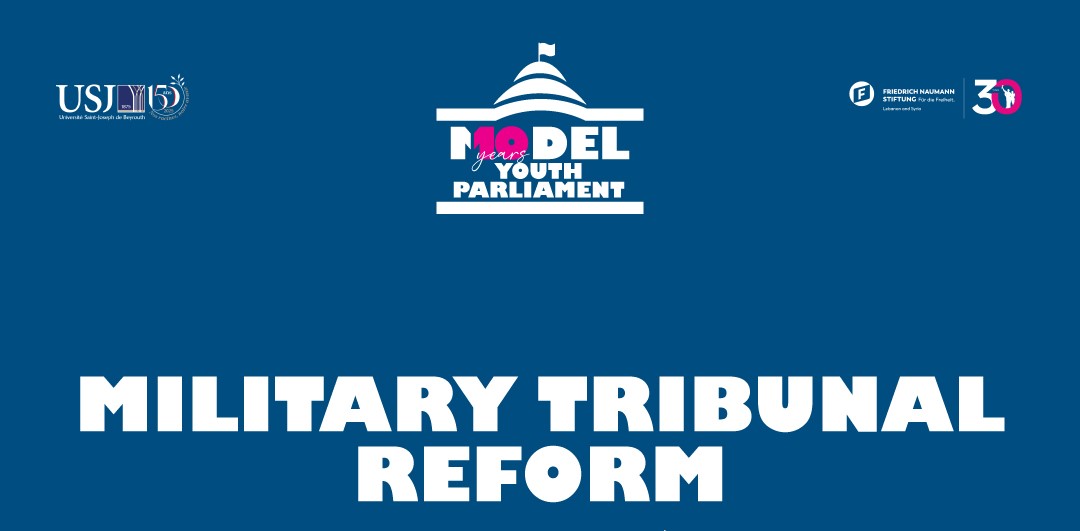Model Youth Parliament
Reforming the Military Tribunal

Written by MYP10 mentors Sandra Zeidan and Charbel Zeaiter
The judiciary is the backbone of the rule of law in any country, and Lebanon is no exception. Judges, in turn, are the guardians of justice, and to perform their duties effectively, they need legal frameworks that are modern, transparent, and protective of their independence. In Lebanon today, the structure of the judiciary is far from this ideal. Among the most urgent areas of reform is the military tribunal system. A new draft law to amend the outdated Military Justice Law No. 24/1968, set for debate during the 10th edition of the Model Youth Parliament (MYP), offers a chance to bring Lebanon closer to international standards of judicial independence and human rights.
The Problem: Military Overreach and Civilian Vulnerability
Currently, Lebanon’s military tribunal enjoys wide jurisdiction, including over civilians, a power that is highly controversial. Civilians in Lebanon can be tried before military courts for offenses ranging from participating in protests to charges related to terrorism. This system has drawn sharp criticism from organizations such as Human Rights Watch and Amnesty International, which have documented numerous violations of due process, including the prosecution of journalists, minors, and activists in courts lacking transparency and independence. These courts are not overseen by the judiciary but by the Ministry of Defense, posing a major conflict with basic rule-of-law principles.
What the Law Proposes
The new draft law proposes a set of crucial amendments. Article 1 redefines the jurisdiction of military courts to limit their power strictly to:
- Crimes of treason, espionage, and unlawful contact with the enemy.
- Crimes against military personnel or UNIFIL forces when the crime is connected to military service.
- Terrorism-related crimes or actions inciting civil war or sectarian conflict.
- Crimes related to weapons and ammunition.
More importantly, Article 1 explicitly excludes from military jurisdiction:
- All crimes committed by civilians, regardless of where they are listed in Lebanese law.
- Non-military crimes committed by military personnel.
- Crimes committed by security officers during investigations, especially those involving torture or abuse.
- Libel, defamation, and cybercrimes.
In addition to curbing the tribunal’s overreach, Article 2 strengthens defendants’ rights by prohibiting any interrogation, whether of civilians or military personnel, without legal counsel present. It guarantees the right of the accused to contact a lawyer, a family member, or an acquaintance, and mandates that a lawyer be appointed through the Bar Association if the accused cannot provide one. This is a major step toward protecting human dignity and the right to a fair trial.
Finally, Article 3 stipulates that the law shall enter into force upon publication in the official gazette.
Why It Matters
These amendments are in line with international best practices. The United Nations Human Rights Committee has long recommended that military courts be used solely to try military personnel for breaches of military discipline , not civilians. Many democratic countries have already restructured their systems accordingly, separating military justice from civil law.
If passed and implemented properly, this law could mark a turning point in Lebanon’s legal landscape. It would protect ordinary citizens from arbitrary prosecution, ensure that trials are conducted under civil law by independent judges, and restore public trust in the justice system. For vulnerable groups such as activists and young protestors, it means safety from the threat of being tried in opaque military courts for exercising their basic rights.
Judicial independence is not a luxury. It is the foundation of any just society. This draft law offers a rare opportunity to lay the groundwork for real reform, one that deserves full public support and serious consideration from parliament.